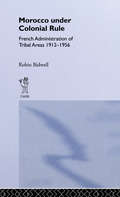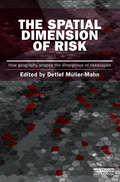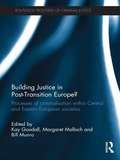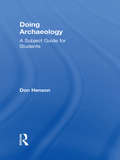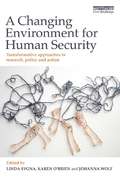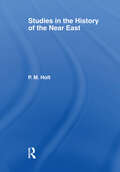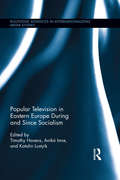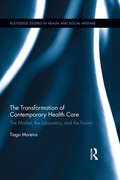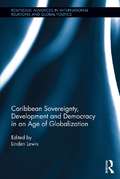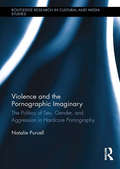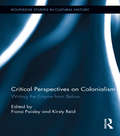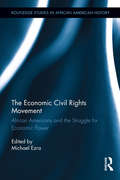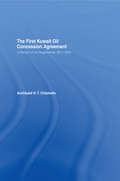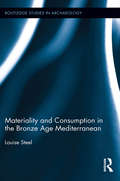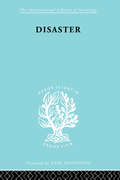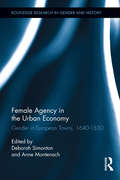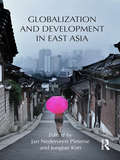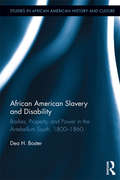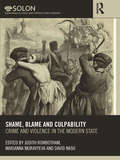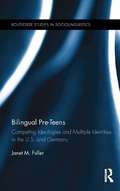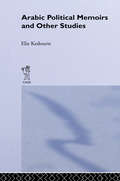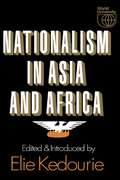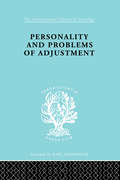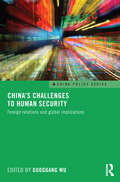- Table View
- List View
Morocco Under Colonial Rule: French Administration of Tribal Areas 1912-1956
by Robin BidwellThis evaluation of the work of a colonial administration uses an analysis of the policies employed in the fields of education, administration, justice and agriculture. It shows how a largely archaic and isolated country transformed itself and its relationship with the western world.
The Politics and Economics of Britain's Foreign Aid: The Pergau Dam Affair (Routledge Explorations in Development Studies)
by Tim LankesterThe Pergau dam in Malaysia was the most controversial project in the history of British aid. Because of its high cost, it was a poor candidate for aid funding. It was provided in part to honour a highly irregular promise of civil aid in connection with a major arms deal. After two parliamentary inquiries and intense media coverage, in a landmark judgement the aid for Pergau was declared unlawful. Tim Lankester offers a detailed case study of this major aid project and of government decision-making in Britain and Malaysia. Exposing the roles played by key politicians and other stakeholders on both sides, he analyses the background to the aid/arms linkage, and the reasons why the British and Malaysian governments were so committed to the project, before exploring the response of Britain’s Parliament, and its media and NGOs, and the resultant legal case. The main causes of the Pergau debacle are carefully drawn out, from conflicting policy agendas within the British government to the power of the business lobby and the inability of Parliament to provide any serious challenge. Finally, Lankester asks whether, given what was known at the time and what we know now, he and his colleagues in Britain’s aid ministry were correct in their objections to the project. Pergau is still talked about as a prime example of how not to do aid. Tim Lankester, a key figure in the affair, is perfectly placed to provide the definitive account. At a time when aid budgets are under particular scrutiny, it provides a cautionary tale.
The Spatial Dimension of Risk: How Geography Shapes the Emergence of Riskscapes (Earthscan Risk in Society)
by Detlef Müller-MahnThrough its exploration of the spatial dimension of risk, this book offers a brand new approach to theorizing risk, and significant improvements in how to manage, tolerate and take risks. A broad range of risks are examined, including natural hazards, climate change, political violence, and state failure. Case studies range from the Congo to Central Asia, from tsunami in Japan and civil war affected areas in Sri Lanka to avalanche hazards in Austria. In each of these cases, the authors examine the importance and role of space in the causes and differentiation of risk, in how we can conceptualize risk from a spatial perspective and in the relevance of space and locality for risk governance. This new approach – endorsed by Ragnar Löfstedt and Ortwin Renn, two of the world's leading and most prolific risk analysts – is essential reading for those charged with studying, anticipating and managing risks.
Building Justice in Post-Transition Europe?: Processes of Criminalisation within Central and Eastern European Societies (Routledge Frontiers of Criminal Justice)
by Margaret Malloch Bill Munro Kay GoodallAfter the collapse of the Berlin wall in 1989 and disintegration of the Soviet Union, scholars focused on the problems of legal transitions within the newly emerging democracies. Two decades on, these states are in ‘post-transition’ conditions; having undergone and continuing to experience political, economic and constitutional upheavals to varying degrees. This book provides an interdisciplinary perspective on this largely unexamined topic. Part I of the book sets the scene with a socio-historical overview and a theoretical chapter; both of which contextualise the book within current debates and provide the theoretical direction of the book as a whole. The later chapters set out contrasting perspectives and consist of themed essays on individual legal systems, investigating these through approaches ranging from socio-legal study to political economy. The book aims to refine important directions for the comparative conceptual study of criminal law policy and processes of criminalisation in emerging democratic states. The result is a significant contribution to the understanding of this subject in the fields of criminology, law, philosophy and political science. The book will appeal to academics, policy-makers and practitioners who are attempting to grapple with the area of "transitions" in the fields of criminology, law, philosophy and political science. As a distinctively interdisciplinary text, it brings together analysis of both the social processes of creating (and abandoning) criminal law and a philosophical reflection. The book provides a comprehensive and critical analysis which points to future directions in criminalisation in the emerging democratic states of Eastern Europe.
Doing Archaeology: A Subject Guide for Students (Doing... Series)
by Donald HensonCovering archaeology from a range of angles, incorporating history, major themes, theories and methods, Doing Archaeology provides a firm grounding for anyone interested in learning more about the discipline. Throughout the book, key information is accessibly presented and important questions are answered, including: What is archaeology? How did archaeology begin? How can archaeology tell us about the past? How can archaeology tell how people use space and the landscape? How can we use the past to understand people? How do archaeology and ‘heritage’ interact? What role does archaeology play in society today? How do we practice archaeology? Drawing on the experiences of practising archaeologists, with engaging examples and studies from sites around the world, this book gives the reader a sense of what is it to study archaeology and be an archaeologist. An essential text for students studying A-Level archaeology, those considering or beginning a degree/foundation degree in archaeology, and those of all ages interested in volunteering or becoming involved in archaeological projects.
A Changing Environment for Human Security: Transformative Approaches to Research, Policy and Action
by Linda Sygna Karen O’Brien Johanna WolfEnvironmental change presents a new context and new opportunities for transformational change. This timely book will inspire new ways of understanding the relationship between environmental change and human security. A Changing Environment for Human Security: Transformative Approaches to Research, Policy and Action both supports and informs a call for new, transformative approaches to research, policy and action. The chapters in this book include critical analyses, case studies and reflections on contemporary environmental and social challenges, with a strong emphasis on those related to climate change. Human thoughts and actions have contributed to an environment of insecurity, manifested as multiple interacting threats that now represent a serious challenge to humanity. Yet humans also have the capacity to collectively transform the economic, political, social and cultural systems and structures that perpetuate human insecurities. These fresh perspectives on global environmental change from an interdisciplinary group of international experts will inspire readers – whether students, researchers, policy makers, or practitioners – to think differently about environmental issues and sustainability. The contributions show that in a changing environment, human security is not only a possibility, but a choice.
Studies in the History of the Near East
by P.M. HoltFirst Published in 1973. Routledge is an imprint of Taylor & Francis, an informa company.
Popular Television in Eastern Europe During and Since Socialism (Routledge Advances in Internationalizing Media Studies)
by Anikó Imre Timothy Havens Katalin LustyikThis collection of essays responds to the recent surge of interest in popular television in Eastern Europe. This is a region where television's transformation has been especially spectacular, shifting from a state-controlled broadcast system delivering national, regional, and heavily filtered Western programming to a deregulated, multi-platform, transnational system delivering predominantly American and Western European entertainment programming. Consequently, the nations of Eastern Europe provide opportunities to examine the complex interactions among economic and funding systems, regulatory policies, globalization, imperialism, popular culture, and cultural identity.This collection will be the first volume to gather the best writing, by scholars across and outside the region, on socialist and postsocialist entertainment television as a medium, technology, and institution.
The Transformation of Contemporary Health Care: The Market, the Laboratory, and the Forum (Routledge Studies in Health and Social Welfare #8)
by Tiago MoreiraThe past three decades have seen enormous changes in the organisation of health care. This book explores the role of knowledge production and technology on these transformations, focusing on the market (attempts to embed principles of economic rationality and efficient use of resources in the shaping and delivery of health care), the laboratory (science, experiments and 'evidence' in the management of research, practice and policy) and the forum (the application of deliberative procedures and other forms of public consultation to health care decision making).
Caribbean Sovereignty, Development and Democracy in an Age of Globalization (Routledge Advances in International Relations and Global Politics)
by Linden LewisMany of the nations of the Caribbean that have become independent states have maintained as a central, organizing, nationalist principle the importance in the beliefs of the ideals of sovereignty, democracy, and development. Yet in recent years, political instability, the relative size of these nations, and the increasing economic vulnerabilities of the region have generated much popular and policy discussions over the attainability of these goals. The geo-political significance of the region, its growing importance as a major transshipment gateway for illegal drugs coming from Latin America to the United States, issues of national security, vulnerability to corruption, and increases in the level of violence and social disorder have all raised serious questions not only about the notions of sovereignty, democracy, and development but also about the long-term viability of these nations. This volume is intended to make a strategic intervention into the discourse on these important topics, but the importance of its contribution resides in its challenge to conventional wisdom on these matters, and the multidisciplinary approach it employs. Recognized experts in the field identify these concerns in the context of globalization, economic crises, and their impact on the Caribbean.
Violence and the Pornographic Imaginary: The Politics of Sex, Gender, and Aggression in Hardcore Pornography (Routledge Research in Cultural and Media Studies)
by Natalie PurcellNo cultural product reveals our collective fascination with sexual violence more candidly than popular heterosexual pornographies. They showcase scenes of intense sexual aggression and cruelty that are gendered in repetitive, patterned configurations—configurations that are designed to arouse. Purcell uses comparative critical analyses of popular pornographic movies to explore common fantasies of sexual violence and how they have changed over the past forty years. Adopting a thick descriptive approach, she moves beyond the mere observation and recording of instances of sexism and violence, elucidating the changing aesthetics, themes, and conventions of depicted sexual aggression and showing how they have emerged in specific socio-historical contexts. Purcell also draws from a range of industry publications and fan forums to examine the fabric and function of misogyny and violence in viewers’ fantasies and everyday lives. By documenting how popular pornographies have changed over time, this study sheds new light the evolving desires and anxieties of the genre’s growing U.S. audience.
Critical Perspectives on Colonialism: Writing the Empire from Below (Routledge Studies in Cultural History)
by Fiona Paisley Kirsty ReidThis collection brings much-needed focus to the vibrancy and vitality of minority and marginal writing about empire, and to their implications as expressions of embodied contact between imperial power and those negotiating its consequences from "below." The chapters explore how less powerful and less privileged actors in metropolitan and colonial societies within the British Empire have made use of the written word and of the power of speech, public performance, and street politics. This book breaks new ground by combining work about marginalized figures from within Britain as well as counterparts in the colonies, ranging from published sources such as indigenous newspapers to ordinary and everyday writings including diaries, letters, petitions, ballads, suicide notes, and more. Each chapter engages with the methodological implications of working with everyday scribblings and asks what these alternate modernities and histories mean for the larger critique of the "imperial archive" that has shaped much of the most interesting writing on empire in the past decade.
The Economic Civil Rights Movement: African Americans and the Struggle for Economic Power (Routledge Studies in African American History #1)
by Michael EzraEconomic inequalities have been perhaps the most enduring problem facing African Americans since the civil rights movement, despite the attention they have received from activists. Although the civil rights movement dealt successfully with injustices like disenfranchisement and segregated public accommodations, economic disparities between blacks and whites remain sharp, and the wealth gap between the two groups has widened in the twenty-first century. The Economic Civil Rights Movement is a collection of thirteen original essays that analyze the significance of economic power to the black freedom struggle by exploring how African Americans fought for increased economic autonomy in an attempt to improve the quality of their lives. It covers a wide range of campaigns ranging from the World War II era through the civil rights and black power movements and beyond. The unfinished business of the civil rights movement primarily is economic. This book turns backward toward history to examine the ways African Americans have engaged this continuing challenge.
The First Kuwait Oil Concession: A Record of Negotiations, 1911-1934
by A.H.T. ChisholmFirst Published in 1975. Routledge is an imprint of Taylor & Francis, an informa company.
Materiality and Consumption in the Bronze Age Mediterranean: Materiality And Consumption In The Bronze Age Mediterranean (Routledge Studies in Archaeology #7)
by Louise SteelThe importance of cultural contacts in the East Mediterranean has long been recognized and is the focus of ongoing international research. Fieldwork in the Aegean, Egypt, Cyprus, and the Levant continues to add to our understanding of the nature of this contact and its social and economic significance, particularly to the cultures of the Aegean. Despite sophisticated discussion of the archaeological evidence, in particular on the part of Aegean and Mediterranean archaeologists, there has been little systematic attempt to incorporate anthropological perspectives on materiality and exchange into archaeological narratives of this material. This book addresses that gap and integrates anthropological discourse on contact, examining exchange systems, the gift, notions of geographical distance and power, colonization, and hybridization. Furthermore, it develops a social narrative of culture contact in the Mediterranean context, illustrating the reasons communities chose to engage in international exchange, and how this impacted the construction of identities throughout the region. While traditional archaeologies in the East Mediterranean have tended to be reductive in their approach to material culture and how it was produced, used, and exchanged, this book reviews current research on material culture, focusing on issues such as the biography of objects, inalienable possessions, and hybridization – exploring how these issues can further illuminate the material world of the communities of the Bronze Age Mediterranean.
Disaster: A Psychological Essay (International Library of Sociology)
by Martha WolfensteinFirst Published in 1998. Routledge is an imprint of Taylor & Francis, an informa company.
Female Agency in the Urban Economy: Gender in European Towns, 1640-1830 (Routledge Research in Gender and History #14)
by Deborah Simonton Anne MontenachThis innovative new book is overtly and explicitly about female agency in eighteenth-century European towns. However, it positions female activity and decisions unequivocally in an urban world of institutions, laws, regulations, customs and ideologies. Gender politics complicated and shaped the day-to-day experiences of working women. Town rules and customs, as well as police and guilds’ regulations, affected women’s participation in the urban economy: most of the time, the formally recognized and legally accepted power of women – which is an essential component of female agency – was very limited. Yet these chapters draw attention to how women navigated these gendered terrains. As the book demonstrates, "exclusion" is too strong a word for the realities and pragmatism of women’s everyday lives. Frequently guild and corporate regulations were more about situating women and regulating their activities, rather than preventing them from operating in the urban economy. Similarly corporate structures, which were under stress, found flexible strategies to incorporate women who through their own initiative and activities put pressure on the systems. Women could benefit from the contradictions between moral and social unwritten norms and economic regulations, and could take advantage of the tolerance or complicity of urban authorities towards illicit practices. Women with a grasp of their rights and privileges could defend themselves and exploit legal systems with its loopholes and contradictions to achieve economic independence and power.
Globalization and Development in East Asia (Routledge Studies in Emerging Societies #2)
by Jan Nederveen Pieterse Jongtae KimEast Asia is widely regarded as the main "winner" in contemporary globalization, unscathed by the economic crisis of 2008, with its leading new industrializing nations and emerging economies. While 20th-century globalization was mainly led by the West, the 21st century is ushering in different dynamics. The re-emergence of Asia involves alternative visions of the world and different perspectives on globalization. This volume seeks to address these dimensions, turning to local reflexivities, notably in South Korea and China, to explore the key debates in sociology and political economy within East Asia rather than from an outside view.
African American Slavery and Disability: Bodies, Property and Power in the Antebellum South, 1800-1860 (Studies in African American History and Culture #39)
by Dea H. BosterDisability is often mentioned in discussions of slave health, mistreatment and abuse, but constructs of how "able" and "disabled" bodies influenced the institution of slavery has gone largely overlooked. This volume uncovers a history of disability in African American slavery from the primary record, analyzing how concepts of race, disability, and power converged in the United States in the first half of the nineteenth century. Slaves with physical and mental impairments often faced unique limitations and conditions in their diagnosis, treatment, and evaluation as property. Slaves with disabilities proved a significant challenge to white authority figures, torn between the desire to categorize them as different or defective and the practical need to incorporate their "disorderly" bodies into daily life. Being physically "unfit" could sometimes allow slaves to escape the limitations of bondage and oppression, and establish a measure of self-control. Furthermore, ideas about and reactions to disability—appearing as social construction, legal definition, medical phenomenon, metaphor, or masquerade—highlighted deep struggles over bodies in bondage in antebellum America.
Shame, Blame, and Culpability: Crime and violence in the modern state (Routledge SOLON Explorations in Crime and Criminal Justice Histories)
by David Nash Judith Rowbotham Marianna MuravyevaThis ground-breaking collection of research-based chapters addresses the themes of shame, blame and culpability in their historical perspective in the broad area of crime, violence and the modern state, drawing on less familiar territories such as Russia and Greece, not just on material from familiar locations in western Europe. Ranging from the early modern to the late twentieth century, the collection has implications for how we understand punishments imposed by states or the community today. Shame, blame and culpability is divided into three sections, with a crucial case study part complementing two theoretical parts on shame, and on blame and culpability; exploring the continuance of shaming strategies and examining their interaction with and challenge to 'modern' state-sponsored blaming mechanisms, including allocations of culpability. The collection includes chapters on the deviant body, capital punishment and, of particular interest, Russian case studies, which demonstrate the extent to which the Russian, like the Greek, experience need to be seen as part of a wider European whole when examining ideas and themes. The volume challenges ideas that shame strategies were largely eradicated in post-Enlightenment western states and societies; showing their survival into the twentieth century as a challenge to state dominance over identification of what constituted 'crime' and also over punishment practices. Shame, blame and culpability will be a key text for students and academics in the fields of criminology and crime, gender or European history.
Bilingual Pre-Teens: Competing Ideologies and Multiple Identities in the U.S. and Germany (Routledge Studies in Sociolinguistics #6)
by Janet M. FullerThis volume examines the connection between socio-economic class and bilingual practices, a previously under-researched area, through looking at differences in bilingual settings that are classified as "immigrant" or "elite" and are thus linked to socio-economic class categories. Fuller chooses for this examination bilingual pre-teen children in Germany and the U.S. in order to demonstrate how local identities are embedded in a wider social world and how ideologies and identities both produce and reproduce each other. In so doing, she argues that while pre-teen children are clearly influenced by macro-level ideologies, they also have agency in how they choose to construct their identities with relation to hegemonic societal discourses, and have many other motivations and identities aside from social class membership which shape their linguistic practices.
Arabic Political Memoirs and Other Studies
by Elie KedourieFirst Published in 2005. Routledge is an imprint of Taylor & Francis, an informa company.
Nationalism in Asia and Africa
by Elie KedouriePublished in the year 1974, Nationalism in Asia and Africa is a valuable contribution to the field of Middle Eastern Studies.
Personality and Problems of Adjustment (International Library of Sociology)
by Kimbell YoungFirst Published in 1998. Routledge is an imprint of Taylor & Francis, an informa company.
China's Challenges to Human Security: Foreign Relations and Global Implications (China Policy Series)
by Guoguang WuThis book looks at human security in China’s foreign relations. It discusses the concept and theory of human security, and their implications for China. The book goes on to analyse environmental security issues, including climate change and water resources, as well as looking at issues from an energy consumption perspective. Significant human security issues are then focussed on, including food safety, pandemic disease control, migration, and the human rights implications of China’s overseas investment.
